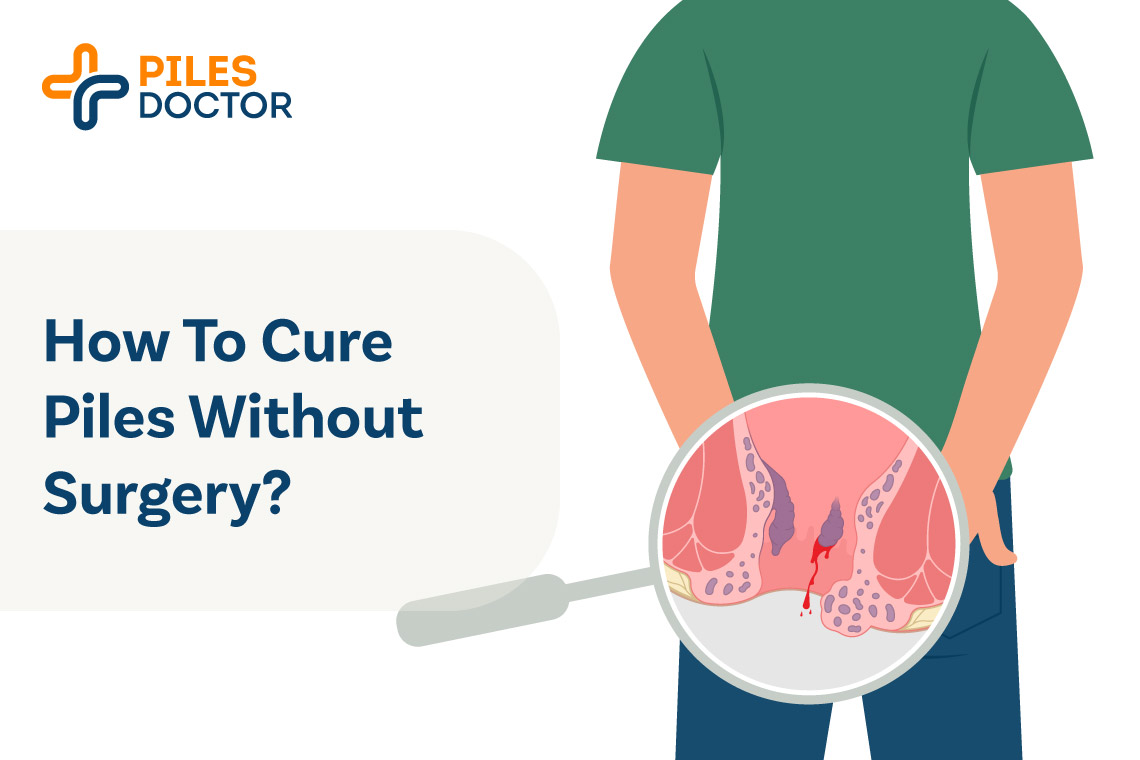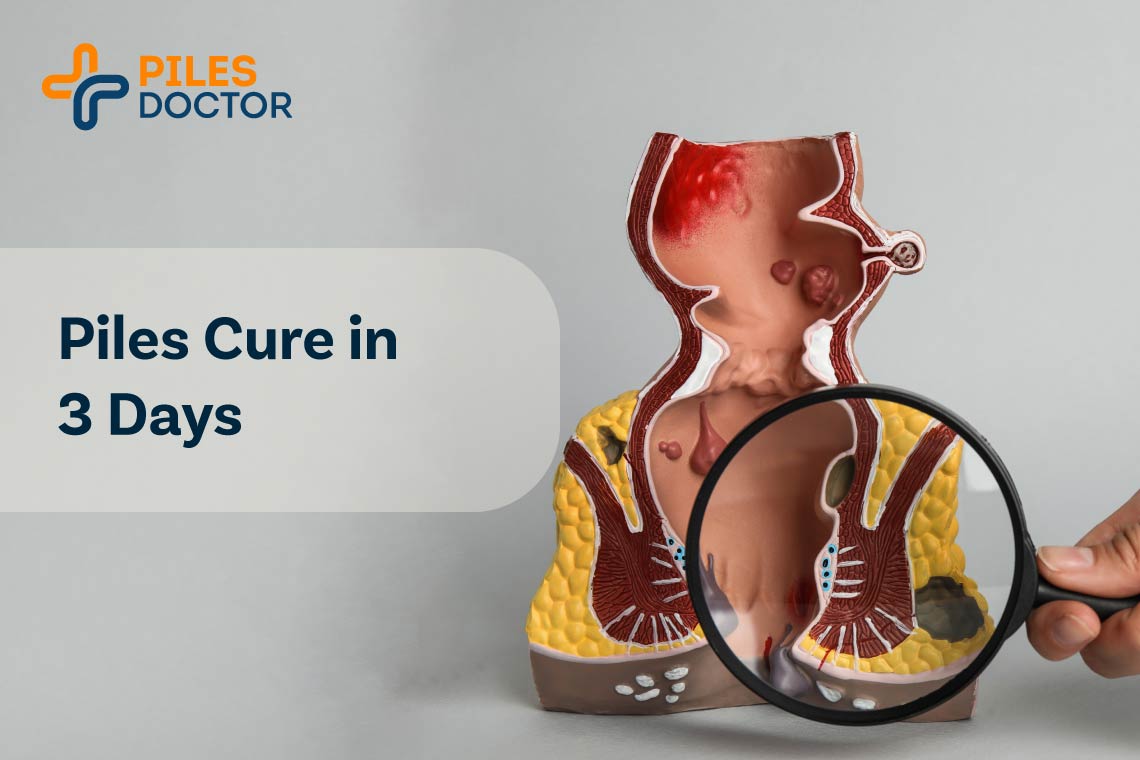What is Anal Fistula?
An anal fistula is an abnormal tunnel developed between the inner lining of the anal canal to the skin near the anus. It can lead to discomfort, pain, and a discharge that may contain pus or blood.
Conditions like Crohn’s disease, certain sexually transmitted infections, or injuries to the anal region can increase the risk of developing an anal fistula. Anal fistula treatment typically involves surgical intervention to drain the infection and close the tunnel. If you suspect that you might have an anal fistula, it’s crucial to consult an experienced proctologist to prevent complications and ensure proper healing.
Types of Anal Fistula
Various types of anal fistulas exist, each with different symptoms and treatment methods.
Intersphincteric Fistula: This kind of anal fistula lies between the internal and external anal sphincter muscles. It causes minimal symptoms which makes the diagnosis complicated. It usually requires surgical intervention to close the fistula tract.
Suprasphincteric Fistula: A supra sphincteric anal fistula is rare and originates from the anal canal and reaches the space above the external sphincter muscle. This particular fistula can lead to notable pain and discomfort. Surgical intervention is typically needed to avert additional complications.
Transsphincteric Fistula: A transsphincteric anal fistula is a passage that passes through both the internal and external sphincter muscles. Typically, it has an external opening close to the anus and an inner opening within the anal canal. Treating this kind of fistula can be intricate and might necessitate surgical measures.
Extrasphincteric fistula: A kind of anal fistula that grows beyond the external anal sphincter, making it a complex condition to address because of its positioning and its impact on various anatomical components. Surgery is the primary anal fistula treatment option to seal the fistula tract and enhance recovery. Proper aftercare and consistent follow-up are crucial to achieving positive results and avoiding recurrence.
Diagnosis and Evaluation of Anal Fistula
Diagnosing an anal fistula typically begins with a consultation, and then some additional tests might be recommended for a more comprehensive understanding. Here’s a breakdown of common diagnostic approaches:
- Physical Examination: During the consultation, the doctor visually inspects the area to identify the fistula. In severe conditions, physical examination is enough to diagnose the condition.
- Digital Rectal Exam: In this test, the doctor will insert a lubricated finger into the anus to feel any abnormal growth.
- Anoscopy: In this procedure, the doctor will use an anoscope to get a close-up view of the inner surfaces of the anus and rectum. This can help in identifying abnormalities that aren’t visible from an external inspection.
- Imaging Tests: Sometimes, doctors might suggest an ultrasound or MRI examination to obtain a more detailed view of anal fistula.
Treatment of Anal Fistula
There are various approaches to treating anal fistula, including:
- Fistulotomy: Fistulotomy is a minimally invasive procedure performed to treat anal fistula. Typically it is performed as an outpatient procedure under general anesthesia so you remain unconscious and won’t feel any pain and discomfort during the procedure. In this method, the surgeon exposes the infected tunnel by opening the fistula tract. While post-procedure recovery allows you to resume daily activities within 2-3 weeks, full healing might span a few months. Fistulotomy boasts a high success rate and minimal chances of recurrence.
Here’s an overview of the complete procedure:
- First of all, you will administered under anesthesia.
- Then the surgeon will make an incision to open the fistula tract.
- Then the surgeon will clean any abscesses or infections.
- Rather than suturing the wound, it’s left open to heal from within to reduce the risk of recurrence.
- With proper care, the surgical area will gradually heal, and reduce the painful symptoms.
The cost of fistulotomy may range between INR 25,000 to INR 60,000 in India.
2. LIFT (Ligation of Intersphincteric Fistula Tract): The LIFT technique is a minimally invasive approach to treat anal fistulas. This procedure is typically performed on an outpatient basis, so there’s no need for a hospital stay. You can return to your normal routine activities within 2-3 weeks after the surgery, though a full recovery can span a few months. LIFT surgery offers a high success rate, substantially minimizing the recurrence risk of anal fistula.
Here’s a brief on the LIFT procedure steps:
- Anesthesia is administered first so that you will remain unconscious and won’t feel pain and discomfort throughout the procedure.
- The surgeon accesses the intersphincteric tract between the internal and external sphincter muscles.
- Then, the surgeon will drain out the infectious fluid.
- Once the procedure is completed, you will be taken to a recovery room for post-operative monitoring.
- As the effects of anesthesia subside, you’re prepared for discharge.
3. Seton placement: Seton placement is a nonsurgical procedure that involves using a surgical thread, typically made of plastic or rubber, to aid fluid drainage. This technique is primarily used to drain abscesses or cysts. A minor incision is made to place the Seton for the draining process. The procedure is minimally invasive and often carried out on an outpatient basis.
Here’s a brief overview of the seton placement procedure:
- Initially, anesthesia is administered to ensure you’re comfortable.
- Next, the surgeon identifies the fistula tract and threads the Seton through.
- The Seton is then securely tied outside the anus, which aids continuous drainage and encourages healing.
- The Seton remains in place to prevent the tract from sealing prematurely.
In India, the cost for seton placement typically ranges from INR 20,500 to INR 55,000.
4. Advancement flap procedure: The Advancement flap procedure is a surgical method employed to address complex anal fistulas. This surgery is typically conducted under general anesthesia, making sure you’re unconscious during the procedure. Most individuals can return to their regular routines in 2-3 weeks, but complete recovery might take a few months. This procedure boasts a high success rate and significantly reduces the likelihood of a recurrence.
Here’s a brief overview of the advancement flap procedure:
- First of all, you will be administered under local anesthesia.
- Then, the surgeon will create a flap using rectal wall tissue.
- This newly created flap will cover the internal fistula opening and effectively seal the tract.
- To keep it in position, the flap will be sutured in place.
- Over time, the surgical area will heal, leading to a full recovery.
In India, the cost of the advancement flap surgery generally ranges from INR 32,500 to INR 1,05,000.
5. Laser surgery: During laser surgery for anal fistula, the patient is typically placed under anesthesia. A small probe is then inserted into the fistula tract, guided by an endoscope or other imaging techniques. The laser energy is delivered through the probe, targeting and destroying the tissues along the fistula tract. The laser energy effectively seals off the fistula tract by creating a controlled thermal injury.
Here’re the steps involves in laser anal fistula surgery:
First of all, you will be sedated under local anesthesia.
- Then, the surgeon will introduce a laser probe into the fistula tract.
- Next, the surgeon will use precise laser energy to close and seal the fistula.
- The tract will gradually shrink and close due to the laser’s effect.
- Over time, the wound will recover and you will start feeling better.
The cost of anal fistula laser surgery lies between the range of INR 30,000 to INR 90,000 in India.
Best Candidates for Anal Fistula Surgery
The following factors make a candidate eligible for anal fistula surgery.
- Patients who have recurrent anal fistulas that haven’t improved with conservative anal fistula treatments.
- Individuals who experience constant pain, swelling, and discharge in the anal region.
- Individuals who have complex or high-risk fistulas, such as those extending into the rectum or involving multiple tracts.
- Patients with health conditions like Crohn’s disease or immunodeficiency elevate the chances of complications.
- Individuals whose daily life is affected by anal fistula symptoms, such as regular abscess development or challenges during bowel movements.
- Patients who are experiencing repeated infections and abscesses due to anal fistula.
- Individuals have fistulas along with other anorectal conditions such as hemorrhoids or anal fissures.
- Those recommended by their doctor to consider surgery as the best anal fistula treatment option.
Preparation Tips for Anal Fistula Laser Surgery
You must be well-prepared before undergoing any procedure. Here are some general tips you should follow to be prepared before the procedure and ensure a successful recovery.
- Medical History: Make sure to inform your doctor about your medical history, allergies, etc. (if you have any) beforehand.
- Dietary Adjustments: You should avoid eating anything at midnight before the procedure to prevent anesthesia side effects. Your doctor might suggest you follow a specific diet a day before the procedure.
- Bowel Prep: Use prescribed enemas or laxatives to clear the bowels, but make sure to consult your doctor before taking any laxatives.
- Avoid Certain Medications: You should avoid taking certain medications such as ibuprofen, warfarin, etc., and other herbal supplements. They might lead to excessive bleeding during the procedure.
- Stay Hydrated: Drink plenty of water to stay hydrated, but avoid alcohol and caffeine as they can cause dehydration.
- Clean the Area: Shower and gently clean the anal region on the day of the surgery.
- Arrange Transport: Ensure someone is available to drive you home post-surgery.
- Detailed Consultation: Understand the procedure, risks, and expected recovery from your surgeon.
- Dress Comfortably: Wear loose and comfortable clothing on the day of the surgery.
- Limit Physical Activity: Avoid strenuous activities a day before the procedure.
- Stay Informed: Ask questions and stay updated about post-surgery care beforehand.
Always consult with your surgeon for personalized preparation guidance.
Recovery Tips After Anal Fistula Laser Surgery
Here are some tips to boost your recovery after anal fistula laser surgery.
- Follow Doctor’s Advice: Adhere strictly to post-op instructions given by your surgeon.
- Manage Pain: Take prescribed medicines on time to manage discomfort and inflammation.
- Sitz Baths: Take regular warm sitz baths to soothe the area and aid healing.
- Dietary Care: Consume a high-fiber diet to facilitate easy bowel movements and prevent straining.
- Hydration: Drink plenty of water to stay hydrated throughout the day and ensure healthy bowel movements.
- Gentle Cleaning: After bowel movements, clean the anal area gently using water and pat dry.
- Avoid Heavy Lifting: Refrain from strenuous activities and heavy lifting for a few weeks.
- Wear Loose Clothing: Loose-fitting clothes can prevent irritation in the surgical area.
- Monitor for Complications: Stay alert for signs of infection or other complications, and consult your surgeon if concerned.
- Rest: Give your body ample time to heal; take short walks, but ensure enough rest.
It’s essential to keep regular follow-up appointments with your surgeon to ensure a safe recovery and address any concerns.
Risks and Complications After Anal Fistula Laser Surgery
Anal fistula laser treatment is a very safe and effective option, but like any other surgery, there are some risks and complications associated with the procedure.
- Infection: Like any other surgical procedure, laser anal fistula treatment also carries the risk of developing an infection at the surgical site.
- Bleeding: Bleeding can occur during or post-surgery, and potentially require further medical attention.
- Pain: Following anal fistula laser treatment, patients might feel some pain and discomfort, but it can be alleviated with prescribed medicines.
- Scarring: Scar tissue development is a possible side effect of anal fistula laser treatment.
- Fistula recurrence: There’s a risk of recurrence of fistula even after surgery.
- Incontinence: In rare cases, anal fistula laser treatment might result in temporary or permanent changes in bowel control.
- Allergic reactions: Some patients may experience allergic reactions to anesthesia or other medications used during the surgery.
- Fistula tract closure failure: In some cases, the laser may not effectively close the fistula tract, requiring further treatment.
What are the Dos and Don’ts After Anal Fistula Laser Surgery?
Here are some specific dos and don’ts instructions after the anal fistula laser surgery.
Do’s after anal fistula surgery
- Follow doctor’s advice strictly: Always adhere to the instructions given by your surgeon, as they know what’s best for your specific situation.
- Keep the surgical area clean and dry: This helps in preventing infections.
- Take your medicines on time: This ensures effective recovery and pain management.
- Eat fiber-rich foods: Foods like vegetables and whole grains can ease bowel movements, reducing strain.
- Drink plenty of water daily: Staying hydrated softens stools, making them easier to pass.
- Wear loose, cotton underwear: This minimizes friction and allows the surgical site to breathe.
- Take short walks: Gentle walking boosts circulation, aiding the healing process.
- Use soft toilet paper or rinse with water: This prevents irritation when cleaning after bowel movements.
- Attend all follow-up appointments: Regular check-ins help monitor your recovery.
- Listen to your body: Ensure you rest when needed, and don’t push yourself too hard.
Don’ts after anal fistula surgery:
- Don’t strain during bowel movements: Straining can put unnecessary pressure on the surgical site.
- Avoid heavy lifting: This can strain the surgical site and can lead to various complications.
- Stay away from spicy or hard-to-digest foods: Such foods can irritate the digestive system and may lead to constipation.
- Don’t take long sits: Extended sitting can put pressure on the healing area.
- Don’t ignore signs of infection: If you notice increased pain, swelling, or any unusual discharge, consult your doctor.
- Refrain from intense physical activities: High-impact exercises can harm the healing process.
- Don’t consume alcohol or caffeine: They can dehydrate the body, making stools harder.
- Avoid wearing tight-fitting clothes: Loose clothes reduce irritation and allow better air circulation.
- Don’t rush recovery: Healing takes time; rushing can lead to complications.
What if the Anal Fistula is Left Untreated?
If an anal fistula is left untreated, several complications and health issues may arise, including:
- Recurrent Abscesses: The fistula can become repeatedly infected, leading to recurring abscesses in the anal region.
- Spreading of Infection: The infection can spread to nearby tissues, leading to conditions like cellulitis or even sepsis, which can be life-threatening.
- Increased Pain and Discomfort: Over time, the pain, itching, and discomfort associated with the fistula can worsen.
- Fistula Expansion: The tract of the fistula may expand or branch out, leading to multiple openings in the skin.
- Scarring: As the fistula continues to drain and heal repeatedly, it can lead to significant scarring in the area.
- Fecal Incontinence: The constant inflammation and recurrent infections can impact the anal sphincter muscles, leading to difficulties in controlling bowel movements.
- Decreased Quality of Life: The discomfort, pain, and recurrent infections can significantly hamper daily activities, leading to a reduced quality of life.
- Chronic Drainage: Persistent pus or bloody discharge can stain clothing and cause constant discomfort.
- Complex Fistula Formation: Over time, simple fistulas can become more complex, branching into multiple tracts, making future anal fistula treatments more challenging.
- Potential Malignancy: Though rare, long-standing, untreated anal fistulas can increase the risk of developing squamous cell carcinoma in the fistula tract.
It’s crucial to seek medical attention if you suspect an anal fistula. Early diagnosis and treatment can prevent these complications and improve the patient’s quality of life.
Home Remedies to Manage Anal Fistula Symptoms
While home remedies can provide temporary relief from the discomfort associated with anal fistulas, they don’t didn’t provide a permanent solution. If you suspect you have an anal fistula, it’s crucial to consult an experienced proctologist. Nevertheless, here are some home remedies to help manage symptoms of anal fistula:
- Warm Sitz Baths: Soaking in a tub filled with a few inches of warm water several times a day can help soothe the area, reduce inflammation, and promote healing.
- Aloe Vera Gel: Known for its anti-inflammatory properties, applying aloe vera gel can help soothe the irritated skin around the fistula.
- Coconut Oil: Coconut oil has natural antibacterial properties and can be gently applied to the affected area to keep it moisturized and reduce itching.
- Turmeric: Turmeric has natural anti-inflammatory properties. Make a paste with water and apply it to the affected area or consume it with warm milk.
- Tea Tree Oil: Known for its antibacterial and antifungal properties, it can be diluted with coconut oil and applied to the affected area.
- Witch Hazel: This natural astringent can reduce inflammation and soothe the skin. Use a witch hazel-soaked cotton ball to dab the area gently.
- Fiber-Rich Diet: Consuming a diet high in fiber can help ensure regular bowel movements, which may reduce the discomfort associated with anal fistulas.
- Stay Hydrated: Drinking adequate water helps maintain regular bowel movements, reducing strain and irritation in the anal region.
- Avoid Irritating Foods: Spicy foods, alcohol, and caffeine can irritate the digestive tract. Reducing or avoiding them might help in managing the symptoms.
- Over-the-Counter Pain Relievers: Certain over-the-counter medicines, such as ibuprofen, can help reduce pain and inflammation associated with anal fistulas.
Always remember these remedies can help manage symptoms temporarily, a surgical intervention is essential to address the root cause of an anal fistula.
Anal Fistula Treatment Cost in India
In India, anal fistula treatment cost starts from INR 30,000 and can go up to INR 65,000. However, the final cost may vary depending on various factors such as big city hospitals charging more than smaller town ones, the severity of the condition, consultation charges of the doctor, cost of diagnostic tests, anesthesiologist charges, etc.
It is better to consult your doctor or healthcare provider to know the estimated cost of your surgery according to your health conditions.
Is Laser Fistula Surgery Covered Under Health Insurance?
Yes, health insurance generally covers the anal fistula treatment cost in India. The extent of coverage depends upon the specific policy chosen by the insured individual.
Some common insurance providers who usually cover the anal fistula treatment cost include Oriental, Religare Health, Manipal Cigna, United India Insurance, Care Health, New India Insurance, Star Health & Allied, Bajaj Allianz General Insurance, ICICI Lombard, Max Bupa Health Insurance.
FAQs
What is the main cause of anal fistula?
An anal fistula primarily results from an infection or abscess in the anal gland. This infection spreads to the skin surface, leading to a persistent, abnormal tunnel between the inner anus and the skin outside.
Is anal fistula a serious problem?
Yes, an anal fistula is a concerning issue as it’s an abnormal tunnel connecting the anal canal to the skin near the anus, which can lead to persistent drainage, pain, and potential infections.
What is the best treatment for anal fistula?
The best treatment for anal fistula is often surgical intervention, with the “fistulotomy” procedure being the most common and effective approach to open and drain the fistula tract. The choice of treatment, however, depends on the fistula’s complexity and location.
Can home remedies cure anal fistula?
No, home remedies cannot cure anal fistula, they only provide temporary relief to the symptoms of anal fistula. Proper surgical intervention is typically required to treat the condition effectively.
What are the foods to eat after anal fistula?
After an anal fistula surgery, it’s recommended to consume a high-fiber diet, including fruits, vegetables, and whole grains, to promote smooth bowel movements and reduce strain on the surgical site. Drink plenty of water and juices and stay hydrated throughout the day.
What to do and avoid after anal fistula surgery?
After anal fistula surgery, it’s essential to keep the area clean and dry while avoiding straining during bowel movements or engaging in heavy lifting.
How long does it take to recover after anal fistula laser surgery?
Recovery after anal fistula laser surgery typically takes 1-2 weeks. However, complete healing and resumption of regular activities may take up to 4 weeks.



